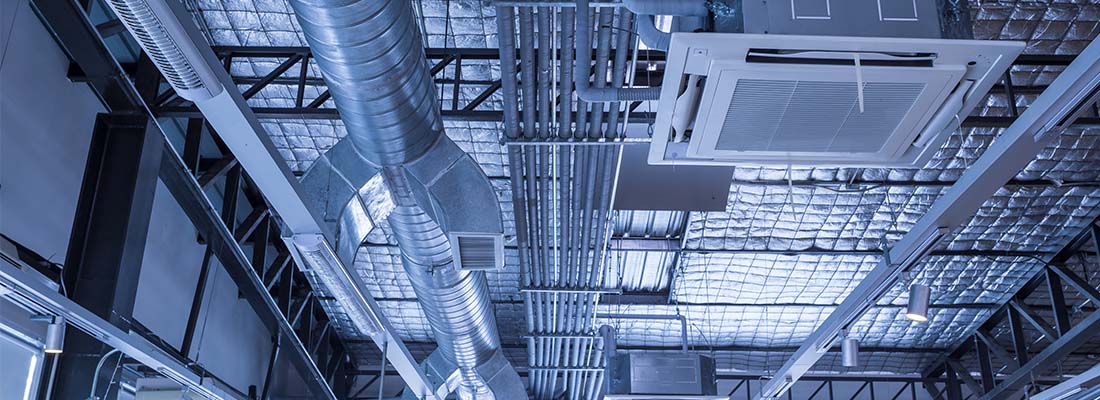Within the cleaning industry, duct cleaning is one of the tasks that can be performed robotically. An early forerunner of robotic cleaning technology, robot duct cleaning has been used since the 1980s in a variety of residential, business and industrial environments.
Around the same time as robotic technology was coming to the fore in the 1980s for use in the home, people were questioning the cleanliness of building air ducts. It was suspected that there were potential problems with the cleanliness of heating, ventilation and air conditioning (HVAC) systems.
This suspicion was in part due to many people contracting Legionnaires Disease at a conference in America in 1976. After investigation it was concluded that this outbreak was due to poor hygiene maintenance of the HVAC systems. It was discovered that poorly maintained air conditioning equipment encourages the propagation of the bacteria that causes the disease.
The importance of duct cleaning
So, what particular issue within HVAC systems could be solved by better duct cleaning? It comes down to the fact that if air ducts within a building are not completely cleaned of debris and dust, they can become host to bacteria and fungi, which can then be circulated through the air and cause illness to people within that building.
Not only did HVAC systems require a better method of cleaning in order to prevent the spread of infectious disease. A comprehensive duct clean method was also essential in the fight against airborne allergies caused by dust and pollen.
This discovery prompted duct cleaning experts within the cleaning industry to realise that they could deploy robots to solve this issue and improve infection prevention. Firstly, before a cleaning solution was developed, they used small robots with cameras to travel through air duct systems and record what they saw.
This footage often proved a build up of debris and dust was present within the ducts and that something needed to be done about it. Proper cleaning and maintenance of HVAC systems was required to improve air purification. The next step was to develop robotic technology to actually clean the ducts, a job that was never performed easily by humans.
Cleaning ducts with robot cleaners
Previously, pressurized air had been commonly used to clean ducts. This worked by deploying an attachment at the end of a long hose and blowing out any dust and debris. However, this method was not efficient, as air ducts often have corners and bends that prevented them being cleaned thoroughly using this solution.
To address the issue of achieving better cleanliness within air ducts, a robot cleaner was quickly developed. Using cameras and lights like the previous inspection-only model, the new versions also had bristles and brushes on board to clean as they went along. So, they could not only detect and record evidence of the dirt, but also sweep it away at the same time!
Some human input was required to manage the operations of these new duct cleaning robots. They were guided by remote control and observed with a TV monitor, to ensure they were performing the cleaning job effectively.
This robotic cleaning solution proved to be far more effective than the pressurized air method. As the cleaning robots had adjustable brushes on all sides it meant they could be adjusted to suit each job and perform a far more comprehensive, hygienic clean.
Advantages of duct cleaning robots
New duct cleaning robots not only made the job quicker and easier, they also saved on costs. Because performing a duct clean now only required an operator to set the robot going and monitor its cleaning route, far less time-consuming manual work was involved.
Due to the fact that the length and shape of ductwork varies, robots simply performed cleaning that would have been virtually impossible before they were invented. Robots can manoeuvre around obstacles and fit into smaller apertures than traditional cleaning tools.
It is not only environmental hygiene that is improved with more efficient duct cleaning. Dust and other debris make HVAC systems work harder. Clogged systems can prevent consistent airflow and so keeping them clean provides homes and businesses with more energy efficient systems, which is great for the pocket and the environment.
Duct cleaning technology and chemicals
There are different types of dirt in ductwork depending on the scenario, for example commercial kitchens may suffer from build-ups of grease in their ducts. So comprehensive cleaning of these ducts results in a more efficient system. Heavy deposits of grease and dirt may require the use of appropriate chemical cleaner liquids to aid the cleaning process.
However, using a robot cleaner means that cleaning operatives are not exposed to the levels of hazardous chemicals required with manual duct cleaning. Researchers are continually working on advances in robotic cleaning technology and will no doubt develop further levels of automation that require less use of hazardous cleaning liquids.
This means that the robotic duct cleaner of the future may require even less manual input, meaning it will be simpler to use for the operative and will be far more sustainable for the environment in the long term.
If you are interested in the future of robotic cleaning technology, including robot duct cleaning machines, a great place to see this tech is Interclean Amsterdam. The world’s leading platform for cleaning and hygiene professionals, Interclean will showcase all the latest advances in robotic cleaning technology from May 10th to 13th 2022 at the RAI in Amsterdam. To book your place visit www.intercleanshow.com/amsterdam/
Receive industry news in your inbox
The cleaning and hygiene industry is on the move and the Interclean newsletter will inform you about what is happening in the industry on a monthly basis.






